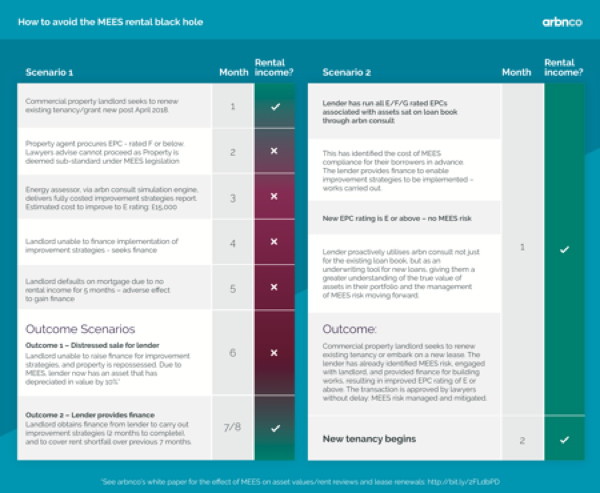Is it MEES you’re looking for?

Mitch Layng believes that MEES offers opportunities if handled correctly. Here he considers the different stakeholders in the property sector and outlines the possibilities that lie in the new legislation for each.
MEES is here, and while not everyone will be affected this month, the impact on commercial properties is undeniable. But it’s not just the owners who will be impacted by these new rules, but occupiers, lenders and other service providers in the property market.
Landlords
One of the biggest opportunities MEES provides is the prospect for landlords to engage with their tenants and in particular exploring the introduction of leases with green clauses to the benefit of both parties.
Landlords should look to improve their building and its operational costs, making it more attractive to existing/new tenants and buyers. In the competitive landscape of the commercial property sector, landlords need to work hard to market their property.
Buildings that perform well in terms of energy efficiency can be marketed as such, and lead to both increased rent premiums as well as demonstrating corporate social responsibility on the part of both landlords and tenants.
Tenants
The legislation will give tenants greater control over buildings. Improvements in the building will lead to a reduction in operational costs, but could also see rent reductions to cover the cost and disruption of fit outs. Tenants will have a greater say in building improvements and can steer any changes to suit their own needs, and also incorporate improvements in the health and wellbeing of the workforce. Rent reductions could also be negotiated to reflect any added value on the building due to the quality of the fit out achieved by the tenant.
Investors
The reduction of risk is a huge factor for investors; a well-run, high performing building will yield better returns and reduce the risk associated with it.
Lenders
Retrofit opportunities present an opportunity to lend and in turn lead to a reduction in risk, with landlords less likely to default on mortgages and loans. However, both lenders and investors need to be aware that it is highly likely the regulations won’t stand still. MEES encourages the Energy Performance Certificates (EPC) to go beyond F&G, so the implication is that it will be strengthened to a minimum D rating in the coming years.
Energy assessors
Collectively, there is going to be the opportunity for a lot more work for energy assessors, but with this comes greater expectations in terms of the accuracy of EPCs. EPCs will be scrutinised and audited like never before. Energy assessors need to ensure they are not ignoring due diligence and presenting poor EPCs. Recent research by Arbnco found that 17.7% of the properties on its platform achieved a lower EPC rating upon re-simulation using the latest Simplified Building Energy Model (SBEM), version 5.4a.
There is huge opening for energy assessors to stand out in a crowded market place by offering the most accurate EPCs and taking much more of an advisory role, rather just being seen as a one-off service provider.
Consultants and agents

In the marketing of commercial properties we will start to see a move away from emphasising “Grade A” towards “future proofed” offices against the MEES legislation. Acquisition experts will be scouring the market place for value generated through poor performing buildings.
FMs and engineers
For both in-house and agency FMs, the energy legislation ought to promote discussion and lead to greater engagement with tenants, looking at both the value of a building and its energy efficiency rating. MEES presents a chance for facilities managers and engineers to prove their worth by demonstrating building improvements and making longterm savings for the occupiers.
Lawyers
It is highly likely that case law will be established as a result of the legislation, so lawyers will play an even more pivotal role with increased scrutiny of leases taking place and advising clients to become compliant. It may also be the case that leases are going to be structured to take into account rent reductions to compensate for any retrofitting.
Surveyors and consultants
Building surveyors and consultants are in a strong position to look at both the energy efficiency aspect as well as fit out opportunities. They will be looking at innovation in the marketplace and what measures can be carried out without affecting building regulations.
Manufacturers and suppliers
There is a huge marketing opportunity for manufacturers and suppliers, but those who will capitalise on it the most will be the ones that prove what impact specific equipment has on the EPC rating. Manufacturers and suppliers need to work with research and development teams in their own firm, or with third party specialists such as Arbnco, to understand exactly what the difference is as well as how systems work together and integrate.
Government
It could be argued that the Government has the biggest stake in making sure MEES is a success. It needs to hit climate change emissions targets, and improving energy performance amongst commercial property will go a long way to contributing towards those targets. The Government’s vested interest will mean that it is likely the legislation will be strengthened over the coming years.
It is often the case that legislation is viewed as an inconvenience, seen as another box to tick, but it is clear with MEES that it presents a real opportunity for a range of stakeholders. The legislation is here to stay and is highly likely to become strengthened, but organisations need to work hard to ensure that they maximise the opportunities available to them. Those that demonstrate innovation, accuracy and efficiency will be the ones that thrive.
Mitch Layng is Lead energy consultant at Arbnco







